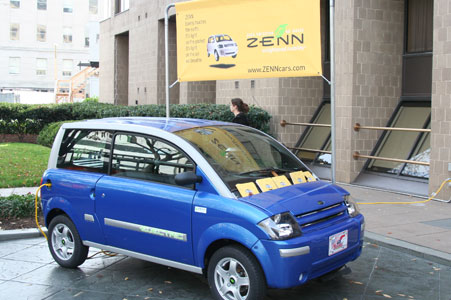
EEStor is a company purportedly on the cusp of commercializing a potentially disruptive technology. EEStor president, former hard drive scientist Dick Weir has been trying to develop something called the EESU or electric energy storage unit.
The device is a solid-state battery-like material that stores energy in a composition-modified alumina-coated barium titanate compound that is screen-printed and pressed in layers. Theoretically this material can hold 10 times the energy of a lithium ion battery at a fraction of the weight, size, and cost making it ideal for electric car use.
Zenn Motors (ZMC), a Canadian company that makes neighborhood electric vehicles, has partial ownership and an agreement with EEStor to use the technology exclusively in vehicles under 3086 pounds.
After years of mysterious debate and passed milestones, recently EEStor announced their material had the permittivity, or ability to store energy, that it claimed.
On Thursday, ZMC has confirmed on their own independent testing that indeed it was true. The material had a permittivity (a ratio) of at least 22,500 and that this was true over a temperature range of -20 to +65 degrees centigrade.
It still remains unknown if the material will operate at the high voltages necessary and what leakage current, if any, may be. The material also outperforms lithium-ion on longevity by a factor of 10 as well.
This confirmation of function has triggered ZMC to increase their investment in EEStor up to ownership of 10.5%.
The next and final milestone will be actual delivery of production-ready EESUs to ZMC who will then put them in ZennCity electric cars.
"The permittivity results are a very significant event for ZMC," said Ian Clifford, Chief Executive Officer of ZENN Motor Company. "We look forward to the achievement of the final milestone under our agreement, the delivery of a full production quality EESU in accordance with our specifications."












